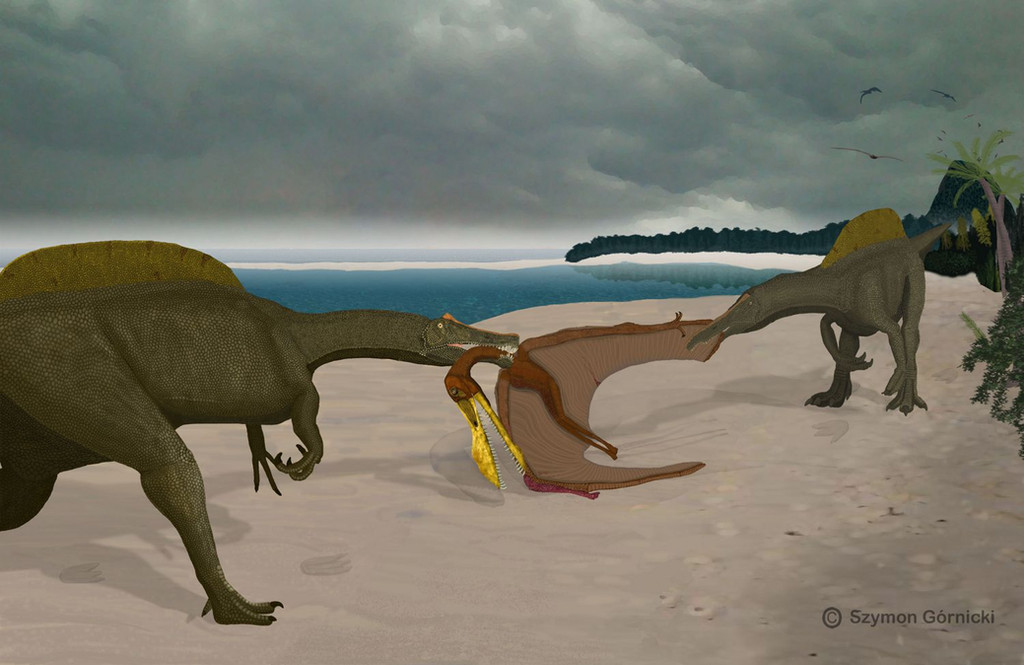HOME | DD
 Szymoonio — Speculative Irritator and scavenging on land
Szymoonio — Speculative Irritator and scavenging on land

#1996 #2004 #al #boones #dinosaur #dinosaurs #land #na #paleo #paleontologia #rekonstrukcja #szymon #tooth #vertebrae #dinozaur #kellner #kości #dinozaury #ilustracja #kręgi #pterozaur #ząb #spinozaur #teropod #challengeri #szyjne #spinosaurinae #with #et #martill #paleosztuka #górnicki #paleontolog #paleontolodzy #ornitocheirid #spinozauryd #spinozaury #tropody #padlinożerstwo #drapieżnictwo #spekulacyjna #illustration #irritator #palaeontology #paleoart #paleontological #paleontology #predators #pterosaur #reconstruction #restoration #scavenging #speculative #spinosaurid #spinosaurus #theropod #theropoda #theropods #illustrationdigital #paleoillustration #spinosauridae #paleoartist #theropoddinosaur
Published: 2016-11-26 14:33:23 +0000 UTC; Views: 5286; Favourites: 53; Downloads: 0
Redirect to original
Description
From: "Spinozaury: ziemnowodni drapieżnicy czy padlinożercy?" S. Górnicki, Wszechświat t. 117, nr 7-9/2016, str 226-227.
Speculative reconstruction of Irritator and new interpretation of pterosaur vertebrae with a spinosaurid tooth.
Since Kellner’s (2004) hypothesis on three pterosaur neck vertebrae with a spinosaurid tooth embedded inside one of them, spinosaurids were considered to be land-based predators. Dispute as he stated “how this happened might never be solved”, he argues in favor of predation scenario as “more likely interpretation” (Kellner, 2004). Because the position of tooth was in vertebral centrum, the vertebra have no hollow base, and the neck is often a target for predators, Kellner (2004) believed that it indicates a struggle of a prey, and consequently the land predation behaviour of spinosaurids. However, another alternative plausibility is that a spinosaurid was trying to gain the access to pterosaur carcass by competing with another carnivore. According to that interpretation, spinosaurid could have lost a tooth as a result of tearing apart the pterosaur body with an opponent. Pulling the carcass by the rival caused “effect of struggle” of a prey. In the cases of tearing-off carrion neck is often the part of the body which scavengers tend to grab. While the lack of scratches and grooves on pterosaur vertebrae can be explained by the assumption that winner of the struggle did not have to necessarily feed on the neck pterosaur if he consumed other more fat-rich parts.
This new interpretation may be even more probable if one would assume that the tooth belongs to Irritator because its remains were found in the same formation which also provided pterosaur vertebras (Kellner, 2004; Bertin, 2010). As well as that Irritator is the closest relative of Spinosaurus (Dal Sasso et al., 2005; Allain et al. 2012) it is possible it had more similar body proportion to Spinosaurus, rather than to other spinosaurids like Baryonyx or Suchomimus. This means Irritator was not too agile on land like Spinosaurus, so it was more difficult for it to hunt pterosaur. But this speculation requires confirmation in the fossil record through finding a relatively complete Irritator skeleton.
www.instagram.com/p/BzECt50Anb…































